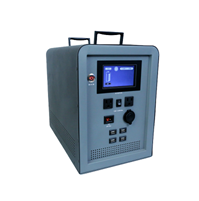What Is a Portable Solar Power Generator Station?
A portable solar power generator station is a device that converts sunlight into electrical energy that can be used to power electronic devices or appliances. It is composed of a solar panel, a battery, and an inverter. The solar panel collects sunlight and converts it into electrical energy, which is stored in the battery. The inverter then converts the stored energy into usable electricity that can power electronic devices or appliances.
Portable solar power generator stations are designed to be used in remote areas where grid power is not available. They are often used for camping, outdoor events, or as a backup power source in case of a power outage. They are also an excellent option for anyone looking to reduce their carbon footprint and live a more sustainable lifestyle.
What to Consider Before Buying a Portable Solar Power Generator Station
- Power Output: The first thing you need to consider when buying a portable solar power generator station is its power output. This will determine how many electronic devices or appliances you can power with it. The power output of a portable solar power generator station is measured in watts (W). The higher the wattage, the more powerful the generator, and the more devices it can power.
- When considering power output, you should think about the devices or appliances you intend to power with the generator. For example, if you plan to power a refrigerator or air conditioning unit, you will need a generator with a higher power output than if you only plan to power small electronic devices like smartphones and laptops.
- Battery Capacity: The battery capacity of a portable solar power generator station is another important factor to consider. The battery is what stores the energy generated by the solar panel and is used to power electronic devices or appliances. The capacity of the battery is measured in ampere-hours (Ah) or watt-hours (Wh).
The higher the capacity of the battery, the longer the generator can run without needing to be recharged. When considering battery capacity, you should think about how long you will need the generator to run and how frequently you will need to recharge it.
- Portability: One of the key benefits of a portable solar power generator station is that it is designed to be portable. However, not all generators are created equal when it comes to portability. Some are heavier and bulkier than others, making them more difficult to transport.
- When considering portability, you should think about how you plan to use the generator. If you plan to use it for camping or outdoor events, you may want a lighter and more compact generator that is easy to transport. If you plan to use it as a backup power source at home, portability may not be as important.
- Durability: A portable solar power generator station is an investment, so you want to make sure it is durable and built to last. The generator will be exposed to the elements and may be bumped or knocked around during transport, so you want to choose a generator that can withstand these conditions.
- When considering durability, look for a generator with a sturdy frame and high-quality components. You may also want to consider generators that are water-resistant or weatherproof.
- Price: When considering price, you should think about how much you are willing to spend and what features are most important to you. A higher-priced generator may have more features, such as a higher power output or larger battery capacity but may not be necessary for your needs. On the other hand, a lower-priced generator may be more budget-friendly but may not have all the features you need.
- It is important to balance the price with the features you need and choose a generator that fits within your budget.
- Brand Reputation: Another important factor to consider when buying a portable solar power generator station is the brand reputation. You want to choose a reputable brand with a proven track record of producing high-quality generators.
Research the brand online, read reviews from other customers, and look for information about the company’s warranty and customer support. Choosing a reputable brand can give you peace of mind and ensure that you are investing in a quality product.
Why It Is Essential to Buy a Portable Solar Power Generator Station
- Reliability: One of the key benefits of a portable solar power generator station is its reliability. Unlike gas-powered generators, which can run out of fuel or break down, solar power generators rely on the sun to generate electricity. As long as the sun is shining, the generator will continue to produce electricity.
This makes portable solar power generator stations an excellent choice for backup power during emergencies or power outages. They can also be used in remote areas where grid power is not available, making them an essential tool for anyone who spends time outdoors.
- Environmentally Friendly: Another benefit of portable solar power generator stations is that they are environmentally friendly. They do not produce emissions or require fuel to operate, which reduces your carbon footprint and helps to protect the environment.
- Choosing a portable solar power generator station over a gas-powered generator can have a significant impact on the environment and help to reduce air pollution and greenhouse gas emissions.
- Cost Savings: While portable solar power generator stations can be more expensive upfront, they can also save you money in the long run. Once you have purchased the generator, there are no ongoing fuel costs or maintenance costs, unlike gas-powered generators, which require regular maintenance and fuel.
- Additionally, using a solar power generator can help to reduce your electricity bills if you use it to power electronic devices or appliances that would normally be powered by grid electricity.
- Versatility: Portable solar power generator stations are versatile and can be used in a variety of situations. They can be used for camping, outdoor events, or as a backup power source during emergencies or power outages. They can also be used in remote areas where grid power is not available, making them an essential tool for anyone who spends time outdoors.
- Convenience: Finally, portable solar power generator stations are convenient and easy to use. They are designed to be portable and can be easily transported to different locations. Once you have set up the generator, it will continue to produce electricity as long as the sun is shining, requiring little to no maintenance.
Conclusion
A portable solar power generator station is an excellent investment for anyone looking to reduce their carbon footprint, live a more sustainable lifestyle, or have a reliable backup power source. When choosing a generator, consider the power output, battery capacity, portability, durability, brand reputation, and price. By investing in a high-quality generator from a reputable brand, you can enjoy the benefits of reliable, environmentally friendly, cost-effective, versatile, and convenient power wherever you go.
FAQs (Frequently Asked Questions)
- What is a portable solar power generator station?
A portable solar power generator station is a rechargeable battery-powered device that combines a battery, solar panels, charge controller, and inverter to provide portable electricity. - What factors should I consider when choosing a portable solar generator?
Consider the wattage, battery capacity, weight, portability, number of outlets, charging options, inverter type, and warranty policy. - How do I determine the right size solar generator for my needs?
Calculate the total wattage of devices you plan to power and ensure the generator’s running watts exceed this total. Also, consider peak power limits for starting appliances. - What types of batteries are used in portable solar generators?
Most portable solar generators use Lithium-Ion batteries, which are lighter, require less maintenance, and can be recharged many times without losing capacity. - What’s the difference between modified sine wave and pure sine wave inverters?
Pure sine wave inverters are more expensive but can handle almost any appliance, while modified sine wave inverters are more common but may not be compatible with all devices. - How long can a portable solar generator power my devices?
The duration depends on the generator’s battery capacity (measured in watt-hours) and the power consumption of your devices. Check the manufacturer’s specifications for estimated run times. - Can I charge a portable solar generator without solar panels?
Yes, most portable solar generators support multiple charging methods, including wall charging and car charging, in addition to solar charging. - What features should I look for in a portable solar generator?
Look for features like pass-through charging, UPS/EPS functionality, smart control via smartphone apps, and an informative LCD display. - How important is the number of outlets on a portable solar generator?
The number of outlets determines how many devices you can charge simultaneously. Consider your needs and look for a variety of outlet types, including USB, AC, and DC. - What’s the average lifespan of a portable solar generator?
The lifespan varies depending on the battery type and usage. Lithium-ion batteries typically last several years with proper care. Check the warranty policy, as it can indicate the expected lifespan and quality of the product.

 In recent years, portable solar power generator stations have become increasingly popular. They are an excellent alternative to traditional gas-powered generators, which are not only noisy and produce emissions but also require fuel to operate. Portable solar power generators, on the other hand, are environmentally friendly, quiet, and reliable, making them an excellent investment for anyone looking to power their home or campsite without relying on the grid. In this article, we will discuss what you need to know before buying a portable solar power generator station and why it is essential to
In recent years, portable solar power generator stations have become increasingly popular. They are an excellent alternative to traditional gas-powered generators, which are not only noisy and produce emissions but also require fuel to operate. Portable solar power generators, on the other hand, are environmentally friendly, quiet, and reliable, making them an excellent investment for anyone looking to power their home or campsite without relying on the grid. In this article, we will discuss what you need to know before buying a portable solar power generator station and why it is essential to 



































